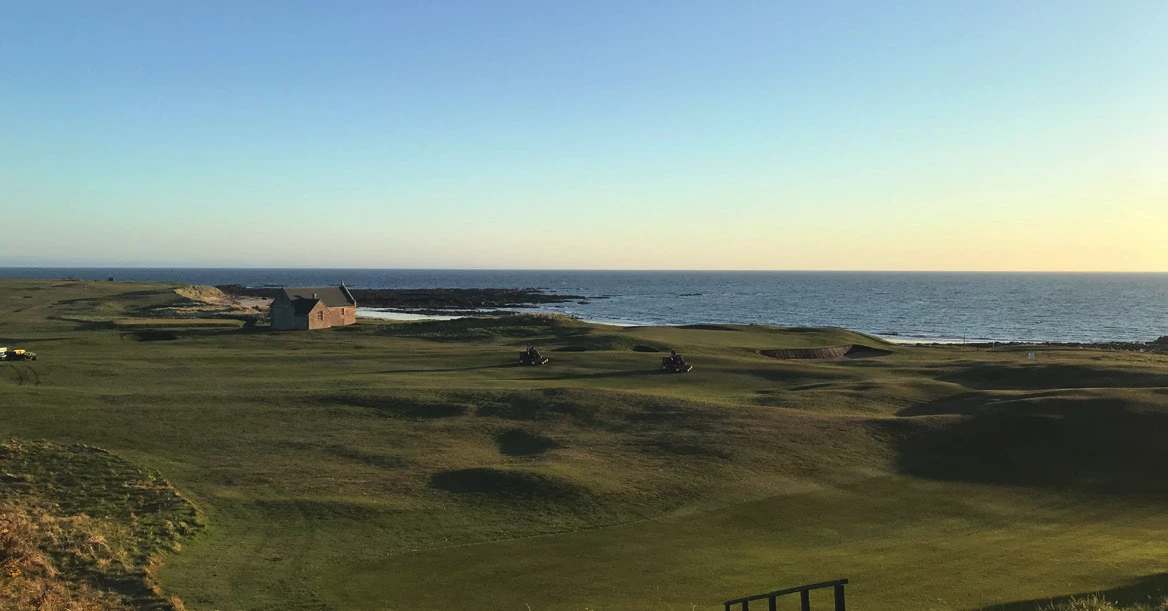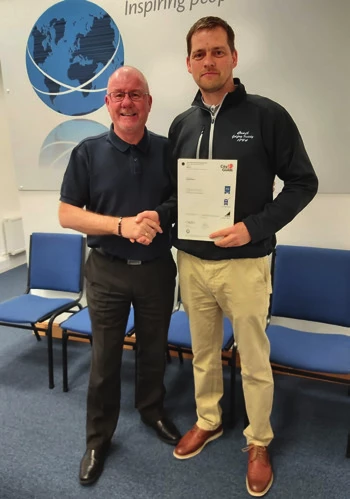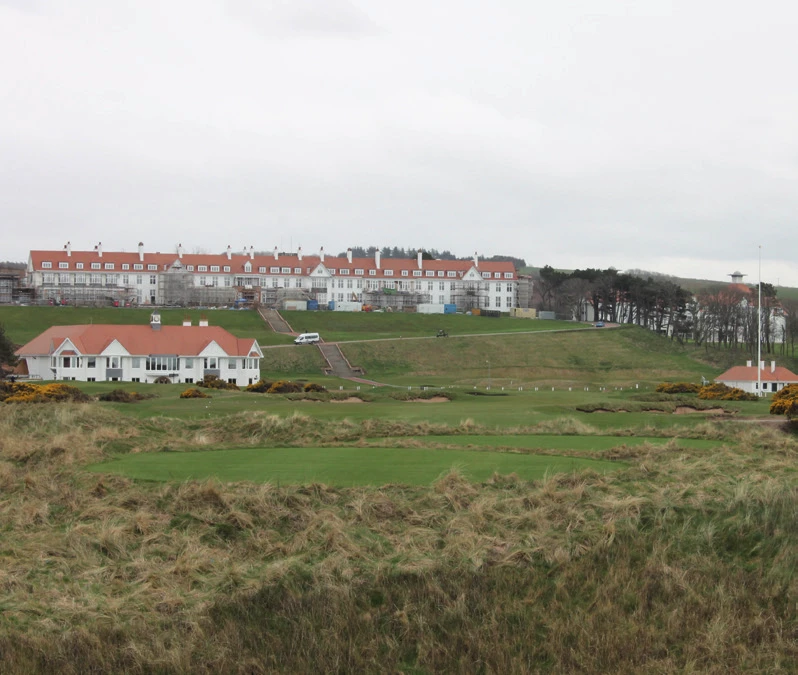Three leading Scottish course managers give their thoughts on the need for continuous personal and professional development
The importance of greenkeeping qualifications is increasingly recognised throughout the greenkeeping industry.
However, as a greenkeeper progresses through their career and takes on more management responsibilities, it is important that they respond to the new challenges of their role by developing their leadership and management skills.
St Andrews Management Centre (STAMC) is a training provider based in Fife with a long history of working with the golf and greenkeeping industry, delivering management and leadership qualifications.
Recently, STAMC Director Rick Bond and BIGGA Membership Services Manager John Young sat down with three STAMC graduates, Bob Meikle, Paul Murphy and Allan Patterson, to discuss the impact that undertaking a Scottish Vocational Qualification (SVQ) in Management at SCQF Levels 9 and Level 11, had on them.
John Young: What makes a good manager?
Bob Meikle: Positivity, flexibility, passion and understanding. I don’t know if that’s something you’ve got in you already or if you learn it over time.
Paul Murphy: I think you’ve got to have thick skin. You’ve got to have a balanced approach and you can’t be headstrong in
the one direction. You can’t be too impulsive about making decisions, although sometimes you must be decisive and that’s part of management, realising when a decision is needed right away. I think a good manager must want to be in that position. It’s also important to have a manager who has come through all the other stages because they’ll be more rounded and know the problems people have because they’ve done it themselves.
Allan Patterson: You’ve got to try your best to lead from the front. They should be someone who has the technical competence and management skill and someone who employees can aspire to be. Someone you can look up to because they do as they say and lead from the front.
I always say to anyone who is in their first supervisory position, one of the main things you must be is consistent. You cannot say one thing and do the other. If you’re expecting the team to do something you must be willing to do it yourself. The old ‘do as I say, not as I do’ is ancient history and you’re going to get zero respect from your team.
John: Qualifications might be a good thing but they don’t necessarily make you a better manager, do you agree or disagree with that?
Paul: Back in the day you only did one Higher National Certificate (HNC). I remember coming out of the HNC going, “What was all that about? What did I do that for? That was a total waste of time” because I wasn’t at that level yet. The penny dropped when I got to a supervisory position and suddenly, the jobs I was being asked to do, I already had the skills to understand what everything meant.
Rick: Qualifications also contribute towards helping people in the team understand what you’re going through, as opposed to asking, ‘I wonder what he does?’ You can train leaders but you should also be training followers. That’s what Paul did with his series of Fife Golf Trust programmes that we ran a couple of years ago. We knew that not everyone was going to go on to be managers, but at least they learned what managers do and what we aspire to.
If you’re greenkeeping or building something you need the right tools… management is the same
Bob Meikle, Crail Golfing Society
Rick Bond: What prompted you to undertake the SVQ?
Bob: I’d done all the greenkeeping qualifications and skills out on the course. Greenkeeping is much more professional and there is a learning curve about how to get the best out of your staff. I want to be a better boss and look after the staff better.
If you’re greenkeeping or building something you need the right tools. With management it’s the same – you need the tools to manage your staff and the business side of things. It’s ongoing and every day you can learn new things.
Paul: The natural progression was always, once you got to a certain level, to progress into management, if that’s what you felt comfortable doing. The motivation once you get there is to gain tools and feel confident so you can take it to the next step.
I think being able to stand in front of people and mentor them is one of the key things.
Allan: I’ve always liked to try and do something, especially in winter, just to keep fresh. But I’ve never been a believer in doing something just for a piece of paper, I’ve got to get some personal development out of it.
When I did try and demonstrate how I was using the learning each day, it made me step back and look at how I did things and do a self-audit.
Allan Patterson, Trump Turnberry
Rick: How has the SVQ achievement helped the organisation you work with?
Paul: Managing Change was fantastic for me as it was what I was going through at the time. One thing we are all guilty of is just taking things on ourselves. What these things do is they encourage you to bring people along with you.
Bob: We are a private members’ club with a lot of overseas visitors. It let me understand other parts of the business such as budgets, working with the committee and getting the committee on your side. It has helped me not just focus on the golf course but consider the stakeholders and the larger picture of the club.
Rick: If I was to put you on the spot, what are key things you learned?
Bob: Listening to staff more and letting them get their side across. Even if it is the smallest little thing on the golf course, ideas come from the ground up. The SVQ made me more open rather than thinking it had to be my way. Instead, I learned to sit back a little and give ownership to other people on the team.
Paul: I think considering the stakeholders was massive for me because I had seven clubs and seven club committees to deal with. Then you have GEO and STRI as stakeholders, SEPA and everyone else.
Conflict Management was also massive as the change was quite drastic. It wasn’t like going into a private club and changing jobs, it was changing locations. Sometimes it was saying to someone that there were other avenues for them to take.
Allan: It made me look at how I manage the whole process. I thought that what I used to do was quite an effective way of doing things, but then you realise maybe it isn’t. When I did try and demonstrate how I was using the learning each day, it made me step back and look at how I did things and do a self-audit.






Rick: What advice would you give to anyone undertaking the qualification?
Allan: You often go into these things and look at the criteria and go, ‘oh I’m not going to be able to do this,’ but I think people do a lot more than they realise. You just need to explain what you do every day. I found that when I did mine, if I was updating any health & safety, man management documents, job sheets or how we manage our day‑to‑day budgets I would then just save them in a folder.
If I was looking for a head greenkeeper or a senior position to fill, if I did see that someone had their L7 & L9 in management I would have a closer look at that person. If they’ve demonstrated that they’ve fulfilled all the criteria, which takes quite a bit of time and effort, then it proves to me a bit of staying power, commitment and work ethic. If I was recruiting and I saw a L7 in a deputy or a L9 in a head greenkeeper, it would demonstrate that they’ve added quite a few strings to their bow.
Paul: If somebody came to me and they were a head greenkeeper I would say, without a doubt, go for your Level 9 and then the natural progression would be to go onto Level 11.
Bob: You must be at that level before taking it on, you can’t just come out of L2 or L3 with five years into the job. You need to be in that senior management position.
I think you need to be in that position or going into it. It’ll flow so much easier and like a jigsaw it all comes together.
Rick: What does the course manager, head greenkeeper look like in three to four years’ time?
Bob: In addition to what we’re doing now, such as team meetings and digital communications including social media, there will be a move to electric or hybrid machinery and a focus on environmental issues. The whole industry is a lot more professional than 20 years ago and hopefully some people will read this article and hopefully become qualified.
Paul: I think it’s going to be more technical. Some of the guys I came up with, if you said to them to work a mobile phone, they wouldn’t know how. Years down the line you’re going to have generations that have been brought up with technology, so they’ll find that side of things easier. But in greenkeeping, other than the change in the machine from petrol to diesel to electric, the principles of the job will remain the same. Most things will stay the same but we will have to be savvy to those changes or we’ll fall behind.
Allan: I think for me, if I was hiring a deputy course manager or greenkeeper in the future, I’d be looking for not just the strong, practical, experienced greenkeeper. To me if a person has got things like their Institute of Leadership & Management (ILM) L7 or L9, they can prove to me that they are a change manager, they can prove team and individual development and that means they have a strong skill set.
About the contributors
Allan Patterson, director of golf courses & estates, Trump Turnberry
Allan started his greenkeeping apprenticeship at Powfoot in 1985. He moved to The Gleneagles Hotel in 1994 and then St Andrews Links in 2005 before joining Trump Turnberry in 2015.
Paul Murphy, golf courses manager, Fife Golf Trust
Paul began his career as an apprentice in 1980 with Dundee Council, where he gained experience at Caird Park and Camperdown. He was promoted to head greenkeeper in 1986 and moved to Downfield in 1995. In 2012 he moved to Fife Golf Trust, which involves overseeing the management of seven golf courses in Fife.
Robert Meikle, golf course manager, Crail Golfing Society
Bob started his career at Crail Golfing Society in 1992, working on the Balcomie and Craighead Links courses. In 2000 he progressed to deputy head greenkeeper of Balcomie then head greenkeeper in 2005. He became head greenkeeper of Craighead Links in 2009 before being appointed courses manager responsible for both courses in 2012.
Originally published by Greenkeeper International, April 2022 @BIGGALtd


